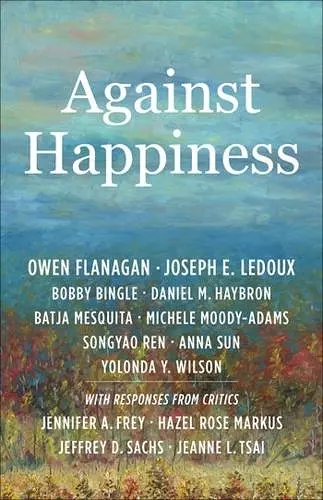Against Happiness
Joseph E LeDoux author Owen Flanagan author Batja Mesquita author Michele Moody-Adams author Daniel M Haybron author Anna Sun author Bobby Bingle author Songyao Ren author
Format:Hardback
Publisher:Columbia University Press
Published:9th May '23
Should be back in stock very soon

The “happiness agenda” is a worldwide movement that claims that happiness is the highest good, happiness can be measured, and public policy should promote happiness. Against Happiness is a thorough and powerful critique of this program, revealing the flaws of its concept of happiness and advocating a renewed focus on equality and justice.
Written by an interdisciplinary team of authors, this book provides both theoretical and empirical analysis of the limitations of the happiness agenda. The authors emphasize that this movement draws on a parochial, Western-centric philosophical basis and demographic sample. They show that happiness defined as subjective satisfaction or a surplus of positive emotions bears little resemblance to the richer and more nuanced concepts of the good life found in many world traditions. Cross-cultural philosophy, comparative theology, and social and cultural psychology all teach that cultures and subcultures vary in how much value they place on life satisfaction or feeling happy. Furthermore, the ideas promoted by the happiness agenda can compete with rights, justice, sustainability, and equality—and even conceal racial and gender injustice.
Against Happiness argues that a better way forward requires integration of cross-cultural philosophical, ethical, and political thought with critical social science. Ultimately, the authors contend, happiness should be a secondary goal—worth pursuing only if it is contingent on the demands of justice.
Happiness studies started as an idealistic project but took shortcuts and so did not fulfill its ambitions. This important and trustworthy book takes us back to the drawing board to rebuild the foundations of this field. The new vision won’t make the science and policy of happiness easier, but it will make them more humane, more inclusive, and truer to life. -- Anna Alexandrova, author of A Philosophy of Science for Well-Being
Reading this book made me happy, but more importantly, I learned a great deal from it. This book is a tour de force: written in a lively, accessible manner; well argued; and empirically well-informed. It is the best available critique of the ideology of the ‘happiness agenda,’ which confuses subjective positive mental states and reported life satisfaction with what really matters. -- Allen Buchanan, author of Our Moral Fate: Evolution and the Escape from Tribalism
Humankind has been preoccupied with happiness since we invented philosophy. We try to cultivate happiness with pithy little sayings, like 'Happiness is a journey, not a destination' and 'Happiness is a state of mind.' We regulate happiness with religion. We judge the quality of a life by the amount of happiness achieved, and the success of a country by the average happiness of its citizens. And yet, no one can agree on exactly what happiness is or what it's worth. Against Happiness masterfully reveals that happiness is not a single experience, physical condition, or unified state of meaning. It's a population of instances that vary across situations and cultures (as are all other categories of emotion). And each instance blooms from unexamined assumptions and preconceptions that likewise vary by situation and culture. This book is a must-read for anyone who has felt happy, hungered for more happiness, or pondered the emotional lives of humans and how happiness matters to the quality of a life. -- Lisa Feldman Barrett, author of How Emotions Are Made: The Secret Life of the Brain
If you are happy read this book. If you are not happy read this book. Either way you will learn about the complexity of the very idea and how it is widely sprinkled throughout our mental space while still remaining an elusive reality. -- Michael Gazzaniga, author of Cognitive Neuroscience: The Biology of Mind
This book is an attempt at doing cross-cultural and thus real philosophy in that it is the love of the wisdom of all peoples, rather than that of the WEIRD (Western, educated, industrialized, rich, and democratic) people. It is also an attempt at interdisciplinary works and thus grounded philosophy. While showing the relativity of happiness, it also insists on the universality of certain human goods, such as human rights and sustainable development goals. -- Bai Tongdong, author China: The Middle Way of the Middle Kingdom
Against Happiness moves beyond the one-dimensional and reductionist approaches that have hitherto limited our understanding of happiness to narrow aspects or have obliterated non-western, non-white, and marginalized experiences of well-being. The authors persuasively outline shortcomings of definitions of happiness across different disciplines and different cultural philosophical traditions, a crucial step for investigating more accurate, inclusive, and expansive definitions of happiness in the future. -- Liya Yu, author of Vulnerable Minds: The Neuropolitics of Divided Societies
ISBN: 9780231209489
Dimensions: unknown
Weight: unknown
360 pages